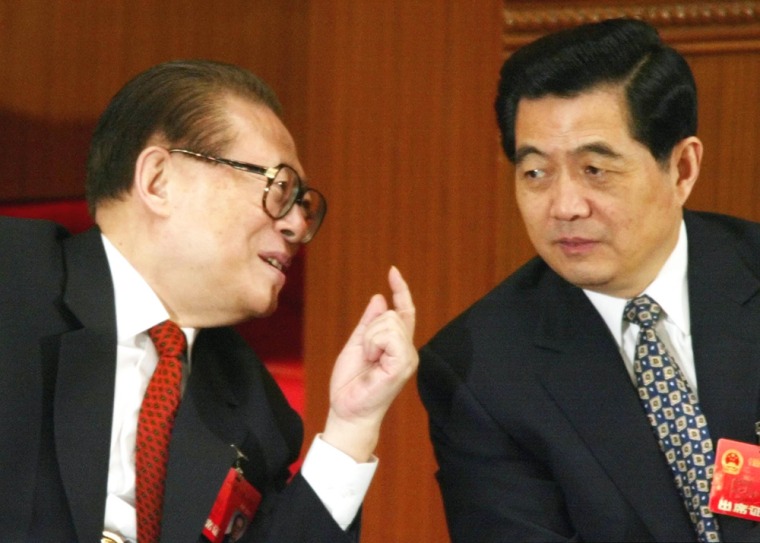"I don't know anything about the leadership struggles, it's not in the newspapers," said newsstand vendor Shao Guofu.
"I don't know much about the leaders' meeting, and we really don't care as long as we can make a living," echoed taxi driver Cheng Xiaoming, adding that "whoever the leaders, they should attack corruption which is now very serious."
Only miles away in the Chinese capital, the nation's top leaders began a four-day gathering to discuss the formidable challenges facing the world's fastest-growing economy.
The elite body, which represents the most powerful men and women from across China, decides on major policies and most important leadership positions.
Yet there was a dearth of official information about the meeting inside China, even as the Western media reported the Communist Party has been riven by a generational struggle for power.
"This meeting is secret," a party spokesperson said, only confirming that the four-day session of the powerful 198-member Central Committee had begun Thursday.
The declared agenda is the party's search for improved "governing ability" after 55 years of communist rule. The term refers to how the Communist Party can remain relevant and effective in a fast-changing country beset by mounting tensions and conflicts, from corruption to massive unemployment.
But most experts are wondering whether aging ex-President Jiang Zemin will relinquish his commander-in-chief position to his younger successor, President Hu Jintao, and thus complete China's leadership transition.
Party elites
"Not much can be read in China's newspapers about this important meeting," said Prof. Li Xiguang, mass communications specialist at prestigious Tsinghua University.
"It is very dangerous if many ordinary people don't care, or think that the leaders' meeting is irrelevant to their lives," Li said. "It's a failure of communications, failure to use the media to explain their agenda."
The professor said the party should use the media to explain its approach to policy and he cited as an example the recent political conventions in the United States.
"I think China's leaders should learn from the U.S. the ability to take advantage of the media to communicate to the public."
According to Western reports, Jiang, 78, has offered to resign from his chairmanship of the Central Military Commission, which commands China's military forces, in favor of the 62-year-oldHu.
But the reports suggested it was part of a bigger internal struggle between the new leadership of Hu and Prime Minister Wen Jiabao, and the so-called Shanghai faction led by Jiang and his chief protégé, Vice-President Zeng Qinghong, 65.
"What do we really know?" said Dr. Cheng Li, expert of Chinese politics at Hamilton College. "Some stories are only speculation and rumor, the pressure for Jiang to give up his position does not necessarily come from Hu Jintao."
Noting, however, that "factional politics" exist anywhere in the world, Li acknowledged that China's leaders could "differ in terms of ideas and priorities."
Different leadership styles
"There is much evidence that Jiang and Hu have a major dispute over the ongoing macroeconomic control, " said Li, referring to the government drive to limit bank lending, land use and fixed-asset investments to cool off the decade-long construction fever in Shanghai and the Yangtze River Delta and divert resources to poorer regions and sectors.
"The fact that the central government can say 'no' to Jiang's turf suggests that Hu and Wen have begun to take the offensive, while Jiang and his associates argue that Hu-Wen's policy is harming the Chinese economy and will perhaps not lead to a soft landing," he said.
Li, who identifies himself in the Western fashion by last name and is the author of numerous books on China's new leaders and government, describes the relationship of the two camps as both "confrontational and cooperative,” with neither side interested in defeating the other.
"I don't think the ongoing 'power struggle' will lead to a major crisis in leadership resulting in socioeconomic chaos," said the author. "Both camps have realized that they are very much in the same boat in trying to keep their ruling party afloat, so they have to compromise."
A sign of fledging democracy?
"What is encouraging is that the various types of tensions, between factions, regions, generations and social strata, are now being acknowledged, and conflicts of interests are recognized," Li said, adding that in broad terms, China's public is aware of policy debates and changes.
"The Chinese public is well-informed about the contrast between Jiang's elitist approach that favors entrepreneurs, Shanghai and coastal cities, and Hu-Wen's populist approach that protects the interests of the inland regions, farmers, and migrants," he said.
"On a series of issues, Hu is pursuing a different path," said a well-informed party source who requested anonymity.
Hu "is seeking common prosperity and greater fairness in contrast to the previous policy of letting a few people get rich first. He is firmer on Taiwan and relations with the U.S, and forging closer ties with Europe, and he is launching a stronger anti-corruption campaign so that many people with links to the past Jiang leadership are being punished," the party source said.
"I like the struggles as they are sign of conflict of ideas and more democracy at the top," said a Chinese journalist who did now wish to be identified, adding that the hazy information from China's media about leadership affairs is compensated by alternative sources like the Internet.
